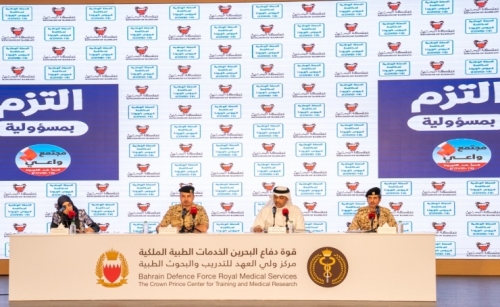Armed for virus fight
TDT | Manama
Bahrain is fully prepared and equipped for any future action that may be required in its battle against the coronavirus (COVID-19), according to Supreme Council of Health Public Hospital Autonomy project manager Lt. Col. Dr. Ahmed Mohammed Al Ansari. He noted that, based on the existing level of preparedness, the Kingdom can deal with 10,000 active cases per day.
Dr. Al Ansari was speaking yesterday during the National Taskforce for Combatting COVID-19 press conference, held at the Crown Prince Centre for Training and Medical Research at the Bahrain Defence Force (BDF) Hospital, where the latest COVID-19 developments were highlighted.
Also at the conference were Ministry of Health undersecretary Dr. Waleed Al Manea, BDF Hospital Infectious Disease Consultant and Microbiologist Lt. Col. Dr. Manaf Al Qahtani, and Salmaniya Medical Complex Infectious and Internal Diseases Consultant Dr. Jameela Salman, all of whom are members of the National Taskforce.
Dr. Al Ansari said that the Kingdom’s healthcare capacity and medical staff is one of five indicators that are relied upon to measure viral community contamination. He explained that isolation and quarantine capacities, and medical professionals on the ground to support active cases, are always evaluated to determine viral transmission.
Among the four other viral transmission indicators enumerated by Dr. Al Ansari was the “Doubling Time”, which denotes the time taken to double the total cases. International standards have stressed the importance of ensuring the doubling of cases does not occur within less than a two-week period.
If the period is less than two weeks, then it means that the spread of COVID-19 is higher than the average. Dr. Al Ansari outlined that the “Doubling Time” among citizens during the past two months went from 27 to 11 days by June 13. This reflects an accelerated spread of the virus among citizens, due to the lack of adherence to the preventative measures and guidelines, Dr. Al Ansari noted.
Another indicator is the percentage of new active cases compared to recovered cases, which should be in a ratio of one-isto-one. If the number of active cases increases with respect to recovered cases and exceeds this ratio, this indicates a wider spread of the virus.
The percentage of active cases in the past week versus recovering cases has ranged between 0.8 per cent to 1.6 per cent, and accordingly, Dr. Al Ansari said it is again advised for all to strictly follow the precautionary measures.
The fourth indicator is the calculation of the rate of positive test results (active cases) to the total number of daily COVID-19 tests, where the percentage of positive results should not exceed more than five per cent of the total number of COVID-19 tests.
In this regard, Dr. Al Ansari said that the percentage of positive results during the past weeks in comparison to the total number of COVID-19 tests in the Kingdom has ranged between 5.7 per cent and nine per cent, which indicates consistency in the spread of the virus. He thus reiterated that it is a further reminder of the importance of fully adhering to virus mitigation guidelines.
The fifth indicator is the Estimated Instantaneous Reproduction Number, Community R(t), which is the number of secondary cases arising from an initial active case, with the number R1 meaning that a person only transmits the virus to one other person.
Dr. Al Ansari said that this reproduction number in the Kingdom last week ranged between 1.3 per cent to 1.8 per cent, adding that the ratio should be less than one in order to overcome the virus. Meanwhile, Dr. Al Manea highlighted that the Health Ministry is monitoring viral indicators in order to shape the necessary precautionary measures required to be followed.
Regarding the recent announcement of precautionary measures to be followed during funeral ceremonies issued by the National Taskforce, Dr. Al Manea emphasised the importance of ensuring that funerals are attended only by close family members, following social distancing and limiting interactions, wearing face masks and gloves, as well as committing to receive condolence messages from others via social media platforms.
Dr. Al Manea went on to outline that the percentage of those who have recovered from COVID-19 in Bahrain has reached 70.45 per cent of registered cases, while the death rate is 0.24 per cent of registered cases. He revealed that isolation capacities at the time of the conference were 8,170 beds, with 3,922 beds being occupied; while 1,718 active asymptomatic cases meeting the required criteria are following optional home self-isolation measures.
Dr. Al Manea further indicated that quarantine capacity was at 3,410 beds, of which 668 were being occupied. For her part, Dr. Al Salman, highlighted that the Health Ministry has increased its daily COVID-19 testing capacity, to ensure early detection and treatment of active cases.
Related Posts

